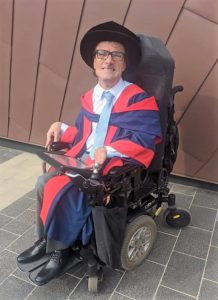 Guest Lecturer
Guest Lecturer
Disability and Community Inclusion
College of Nursing and Health Sciences
Thesis ‘Lived experiences of people with complex communication needs: Romantic and Sexual Relationships’
Sharing my reflections;
It is an honour to be recognised for the hard work I put in over the six years and to have this opportunity to highlight the unmet needs of people with communication and physical disabilities and their lovers.
Submitting my thesis was a fantastic moment. But I really enjoyed being a part of a vibrant community of other PhD candidates and academics.
I am proud to be able to give voice to a group of people who are rarely heard in the wider community, let alone in research on such an important topic.
Because of the difficulties this group faces due to their communication disabilities, researchers often do not have the extra time to allow them to be involved in research.
My research helps inform the conversation around methodology and methods for inclusion.
On choosing PhD and applying beyond;
Since the age of ten I thought it would be cool to have a PhD and be called “doctor”.
However, as I started my working career and as I proceeded through my academic education, I realised that a PhD would allow me to conduct a significant piece of research that could benefit others, people with disabilities and the people who surround them, as well as support workers, therapists, students and academics.
A PhD provides career opportunities, social capital within academia and increased opportunities to make the world a better place by influencing government policy.
My research was in the Augmentative and Alternative Communication field, which Associate Professor Pammi Raghavendra is a leading researcher within.
I had worked with Associate Professor Raghavendra on previous research projects, including my Honours research, so she was an obvious potential supervisor to invite to be my primary supervisor.
Soon after commencing my PhD at another university, I realised that my PhD research was better suited at the Disability and Community Inclusion Unit at Flinders University.
Despite having a few changes in my supervisory team in the stages, I was privileged to have had Associate Professor Ruth Walker and Doctor Paul Jewell as co-supervisors.
Their advice throughout my candidature was invaluable and, without a doubt, me to produce an award winning thesis.
You need to believe in your PhD research. Ensure that it has a higher purpose than achieving your qualifications. While keeping your ultimate goal of graduating in mind, set yourself smaller daily and weekly goals that you can work toward.
Achieving these small goals will give you the boost you need to continue the hard slog of finishing your PhD.
After a few months of recovering from doing my PhD, I had commenced making contact with potential employers. As I knew it can be difficult to find post-doctoral positions, especially so since I have physical and communication disabilities, it was important for me to make the first moves.
This has begun to yield fruit. I have had offers to join a couple of research projects and a possible part-time position for six months at the university.
I believe that my PhD research has given me an excellent foundation to build my career as a lecturer, public speaker, researcher and adviser within and outside the disability sectors.
I am looking forward to helping educate future disability workers across a variety of fields, which in turn will assist people who live with disabilities.
One of the most important contributions of my research has been to provide an opportunity for the voices of people with physical and communication disabilities to be heard on a very important and underexplored topic.
I believe I have demonstrated that research can be inclusive and that there is an appetite within the community to continue to explore this vital conversation.
My research will influence future research and practice within the disability field, especially in the AAC and Assistive Technology fields.
I look forward to seeing new technology solutions which may emerge as a result.

